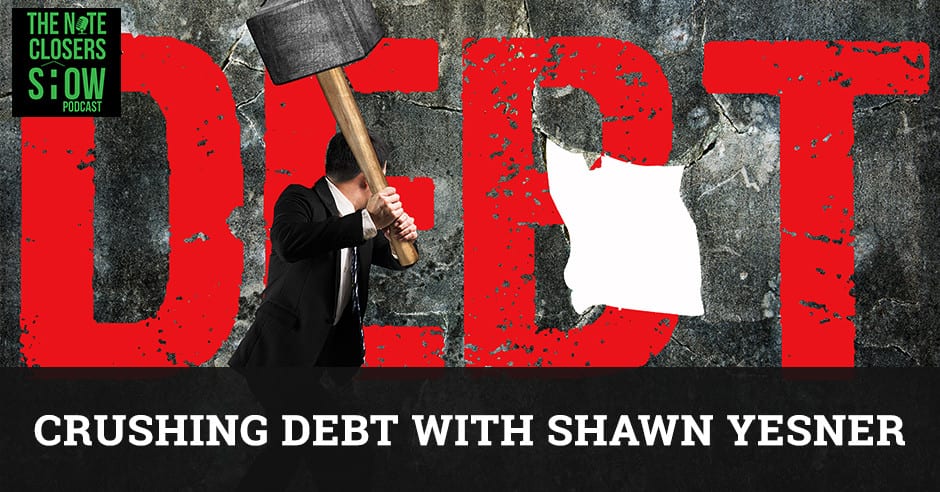
If you’re working on note deals or foreclosure or just an investor looking for a very knowledgeable attorney to help you out with things related to the real estate business, you might want to seek out Shawn Yesner. Shawn is a bankruptcy lawyer with twenty years of bankruptcy and real estate experience. Shawn hosts the Crushing Debt podcast where he interviews realtors, mortgage originators, as well as different attorneys with specialties on probate, intellectual property, personal injury, and other areas. Shawn says the podcast is designed to support his law firm, Yesner Law. Learn more as Shawn talks about getting rid of debt, how foreclosure works, and the whole thing about how bankruptcy works.
—
Listen to the podcast here
Crushing Debt with Shawn Yesner
I’m extremely excited to have our special guest on here. This guy has got such a very busy schedule because he is so busy helping investors, helping borrowers out there. We are jacked up to have Shawn Yesner, from the Yesner Law Group joining us. Shawn, welcome to the Note Closers Show.
I appreciate the opportunity to be on the show.
For those that don’t know who you are and the magic that you do, why don’t you share with our Note Crew exactly who you are and your specialty and what you focus on.
I graduated law school twenty years ago. I passed the bar and became a Florida license attorney. My entire career has been in real estate related. My first job right out of law school was doing residential and commercial closings with an attorney down in Miami, which is where I grew up. I was born in Tampa and, as they say, you can take the boy out of Tampa, but you can’t take the Tampa out of the boy. I migrated back here. I followed my instincts as to where I was born and migrated back here in 2001, took a job at what we would now call a foreclosure mill, and learned how to do foreclosures.
Representing lender’s got good at it. Thought it was a fascinating area of law. My fastest foreclosure start to finish is 97 days from foreclosure sales. In 2004, the owner of the firm came to me and said, “I’m shutting the firm down. I don’t want to do foreclosure law anymore.” She ended up doing her passion, which was intellectual property, patents, trademarks, copyrights. I thought, “I could move laterally,” but I’m six years out of law school and I always knew I wanted to hang my own shingle.
Let me take what I know about speeding them up and let me see if I can slow them down. That started me on the path that I’m at now. The bulk of the firm’s practice does focus still on real estate and real estate litigation, including quiet titles, evictions, partitions, foreclosures, loan mod, short sales. You can’t know all of that stuff without understanding how bankruptcy works. I do a lot of bankruptcy work for debtors and creditors. I do a little bit of bankruptcy work for creditors and then I always enjoyed doing the foreclosures from the plaintiff’s perspective, so I’ve got a good little group of real estate investors building up here in Florida that are hiring me to negotiate when they buy either performing or nonperforming notes. When something goes sideways. I represent them and help them. That’s a basic overview of the law firm.
I guarantee our listeners on iTunes, Stitcher, and all the podcast platforms will be salivating right now because I know I am.
I am a Florida attorney and that’s all. Anybody in Florida. I can absolutely help them wherever they’re located in Florida. I can also appear in federal courts all over the state of Florida. If you’re outside of the state of Florida, that’s where I might have to refer you to somebody that I know that is me, but in another state.
One thing you also do is you have a podcast called the Crushing Debt Podcast.
The Crushing Debt Podcast, which is designed to support the law firms, is on iTunes. It’s on Spotify. All the artificial intelligence ladies love me. It’s on all those as well as on the firm’s website too.
Let’s take it from a different standpoint. Let’s take it from the borrower standpoint and accounting and walking through that time frame. Why don’t we start at the beginning of a borrower’s in default or they’re overwhelmed. What’s the kind of their first step to filing bankruptcy if that’s a choice?
There are two different kinds of bankruptcies that most of us are concerned about if we’re going to file personally, and that’s chapter seven, which is called liquidation. Then chapter thirteen, which is reorganization or a payment plan bankruptcy. Chapter seven is the shortest one, assuming there are no complications from the day we file it until the day the borrower or getter gets her discharge is probably anywhere from four to six months depending on how long it takes the trustee and the court system to push paper. The chapter thirteen is significantly longer. 36 months to 60 months, three to five years in length to afford the time to make all the payments that the borrower needs to make. Mostly we want to try to get people into chapter seven because it is the faster of the two options.
I’ll always review and if there are some other reason, we’ll get into other reasons why you might want to file thirteen even though you qualify for seven. Aside from that, the basic premise, what assets does the borrower own, what assets does the debtor own. Then we figure out which of those assets can be exempt. For example, here in Florida, if they own their home, any equity in their home is exempt. They can protect all of it. Florida also allows a $1,000 exemption for a car, $1,000 what we call a wildcard exemption. Then that wildcard exemption goes to $5,000 if the borrower debtor does not own their primary residence. In practice, let’s assume somebody has a car worth $50,000 and it’s free and clear you get a $1,000 auto exemption.
The equity you have in your car that is not exempt is $4,000. $5,000 minus $2,000 in a chapter seven, the trustees literally going to hold out their hand and say, “Where’s my $4,000? Or give me the car.” Then once you pay the trustee that $4,000, they’re going to disperse that $4,000 out to your creditors, bankruptcy’s over. Similarly in the thirteen, the trustee is going to want that $40,000, but now because we’re talking about a payment plan, they’re going to want it over three years, four years, five years, so it’s good. For easy math, let’s say it’s a 36-month bankruptcy plan. We’ve got to pay $4,000 to our unsecured creditors a little bit over $100 a month. The creditors then would get the $40,000 from the bankruptcy trustee. Bankruptcy cases is over. That’s one test that we look at is what assets do you have or does the debtor have that are not exempt.

Crushing Debt: As the debtors making their payments to the trustee, the trustee is paying the remainder of that fee.
The bigger test is called the means test. What we do is we look at your last six months of income, actual gross income. What did you earn over the last six months? We annualize that number. Then we compare that number to median income. What is the median income? If that number is less than the median income, then you can file chapter seven. If that number is more than the median income, then we have to go through a formula that’s very similar to an IRS offering compromise formula. At the end of that formula, some number drops out, so we get some number. That number’s disposable monthly income. If that number is break-even or negative, we can still file chapter seven even though our income is higher than median. If that number comes out as a positive, we’re filing a chapter thirteen and that’s our payment amount.
Let’s assume we’ve run the means test formula and $300 comes out. That means we got to pay on a 60-month bankruptcy plan, $300 a month. That’s $18,000 and that money then gets dispersed to the unsecured creditors. What the trustee will do is say, “Which of these two tests produces the most money to unsecured creditors?” If it’s the assets we’re going to pay based on the assets, if it’s the means test, we’re going to pay based on income. In the example that I made up here, $40,000 for the value of a car, $18,000 of disposable income, the trustee’s going to say forget about the car, I’m going to get more by you paying your disposable income into the bankruptcy plan, and then the trustee disperses that money out to the creditors.
There’s the forum. One of the nine-page bankruptcy forum that the borrowers have to fill out initially come a quick form or is it. There’s also a longer version of that too.
What a lot of bankruptcy attorneys will say is that the petition itself is eight or nine pages long. There are schedules that support the petition. An entire bankruptcy package could be more than 50 pages. Even for a simple bankruptcy to include the petition and all the supporting documents. Talking about what a lot of bankruptcy attorneys will do is he’ll file what we call a bare bones petition, means either nine pages. I don’t like doing that as a practice pointer for two reasons. Number one, it’s hard to then track down the client again after they leave the office to put the rest of the petition together and get them to sign it. Number two, it increases the cost to the client because with the filing fee, we file all the schedules. If we have to add creditors after the filing, that incurs an additional smaller filing fee. It costs them more money not to file a complete petition.
What’s the normal cost for someone to file full petition right off the bat? I know it’s a very little bit dependent creditors and things like that, but ballpark, for somebody to be able to afford to file BK.
I charge for a chapter seven, I charge anywhere between $1,250 to $1,500 and $2,000 as a max. Although if it’s complicated, I might go higher than that. For a chapter thirteen, what’s happened is in any bankruptcy, attorneys have to describe to the bankruptcy court, “Here’s how much we earned and here’s why we’re entitled to our fees.” What the bankruptcy court did was a bankruptcy court said, “We think it’s bankruptcy will cost X,” so attorneys, if you want to charge more than that, you have to prove up all your time and do records and affidavits and supporting affidavits from other attorneys and all this other nonsense.
If you want to charge below that amount, we’re not going to take a look behind your time records. That fee we will assume is reasonable. For a chapter thirteen in the Tampa market, that fee is $4,500. What happens is the attorneys break it up so that I take anywhere from $1,500 to $2,000 upfront and then the rest of it goes into the bankruptcy plan. As the debtors making their payments to the trustee, the trustee is paying me the remainder of that fee.
It’s the time frame for that. If somebody is facing a foreclosure trial or foreclosure auction, how long does it take from the time that they walk into your office or give you a phone call to put that together? I know it may vary a little bit, but what’s the time frame for getting that file roughly?
At its fastest, I would probably say 24 hours. Don’t walk into my office expecting to file today. One of the reasons is the bankruptcy code, when it was amended in 2005, Congress perceived that debtors we’re taking advantage of the bankruptcy system. There was a huge overhaul in 2005. One of the things that happened as a result of that overhaul was a debtors in bankruptcy are required to take what’s called a consumer course on a debtor education course before they’re allowed to file. Theoretically, if you took the course in the morning, we could file it in the afternoon. If somebody’s coming into my office, I’m probably going to tell them, “You got to take the course. We got to collect documents.”
I need pay stubs so I can calculate the means test. I need tax returns. I need information on the value of assets and the amount to pay off those assets and who are the creditors and all this other stuff. If I had to, I could get a bankruptcy knocked out in a day. That would probably be a situation where I charge more because I got to put other clients on the back burner. Typically, I ask my clients to give me a week or two between the time we have the initial consultation and the time we’re filing at max. Some clients, it’s more than that. I’ll take my bankruptcy fee in installments.
A lot of people say, “If they’re filing bankruptcy, how do they pay you?” My answer is upfront, but if they need to file, I’ll allow them to make payments in installments. Then once that last installment is paid as a flat fee, we go ahead and file, so while they’re paying those installments, send me the information electronically. I’ll store it in my Cloud. Then once we’re ready to file, we complete the petition. They come in, they sign it, and I push a button. Everything’s filed electronically here in Tampa. It’s typically about two weeks, but I could do it faster or slower depending on circumstances.
Homeowners in Florida, are you trying to see them fall more chapter seven or chapter thirteen?
It depends on the goal. One of the first questions I’ll ask in any consultation is what do you want to do with the house? If they say, “I want to keep it,” then we’re talking about loan modification. We’re talking about thirteen because at thirteen, either we can do a loan modification within the bankruptcy through the chapter thirteen, the payment plan bankruptcy or we can may create a bankruptcy plan where you’re paying back to monthly payments and then you’re paying back some portion of the arrears so that when the bankruptcy is over, the loan is current. If they want to keep the house chapter thirteen, if they say, “I want this to be over with, I want this burden off my back. I want to get rid of the house, we’re talking in short sale deed in lieu or chapter seven
Cash for keys and some situations too?
Typically with a deed in lieu we will always try to deed the house back to the bank in lieu of the bank foreclosing. Even in a situation like that, let me see if we can negotiate some cash for keys.
That’s a good thing. As a note investor, I love BK Chapter thirteen. I’ve got a buddy that runs a hundred and $150-million fund out of New York, it’s all based on buying BK chapter thirteen loans for the payment plans and the cash flow. He’ll buy anything at the BK chapter thirteen from any of us investors are things that happen on our borrowers too. Let’s talk about chapter sevens because I know that when the ideal people. I’ve got a couple with the borrowers, we filed chapter seven, we’re not responsible the house. That doesn’t mean you get to stay in that house.
A couple of things and some of this might be Florida specific. If you’re going to file a chapter seven, there’s no mechanism. If you’re behind on your mortgage, you’re going to have to pay to catch up the house if you want to keep it. That means you’re going to have to reinstate the loan. You’re five, six, seven months behind, your payment’s $1,000 a month, you’re easily over $10,000 with attorney’s fees and costs and late charges and inspections and drive-bys. You’re probably $10,000 or more to reinstate the loan, so trying to save a house in a chapter seven isn’t going to happen. The bankruptcy stay, so the instant the bankruptcy is filed and file it electronically, the automatic stay goes into effect which stops everything everywhere, no collection activity, foreclosure sales, all that stuff, stop

Crushing Debt: If you’re going to file a chapter seven, there’s no mechanism.
What will happen is the bank will go into the chapter seven case and say, “We were getting ready to go Io foreclosure sale and so we want to continue with that foreclosure sale. We want relief from the bankruptcy stay. Nine times out of ten, 99 times out of 100 the court’s going to agree with that and give the bank relief from stay so they can go back in and try to foreclose. The chapter seven itself, at least here in Florida, does not transfer title to the house. The trustee can take title to the house and the trustee can then sell the house and a lot of our chapter seven trustees here in Tampa will do short sales.
They’ll say it’s my house and I’ve got my team and so I’m going to do the short sale and they’ll bring some money into the bankruptcy estate that way. The biggest misconception that owners have is that by filing bankruptcy that somehow transfers title to the house, that’s not true. I’ve had chapter seven cases where years after the fact, a code enforcement comes in, associations come in, all those people come in and say, “We know you did bankruptcy you six, seven, eight, nine years ago, but you still own the house and we want our assessments, we want you to mow the lawn. We want this, we want that.” It doesn’t actually transfer title. The other interesting thing on that point, there was a case out of Atlanta. Atlanta’s in the eleventh circuit. The eleven circuit covers Atlanta, Alabama and Florida. This is binding case law in Atlanta, Alabama and Florida probably binding case law in other states. I know it binds us here in Florida there was a case called the Failla Case.
The debtors last name. What happened was they filed bankruptcy in a chapter seven within their chapter seven. They said, “We are surrendering. We’re giving up the house. We don’t want the house anymore.” That doesn’t transfer title to the house at all. The foreclosure then proceeded when the bankruptcy was over because there was no more automatic stay. Borrowers then defended the foreclosure lawsuit in State Court, so they brought a standing and ROBO signing and whatever defenses they brought. The bank went back to bankruptcy court and said, “Judge, if they surrendered it, why are they still allowed to fight it in state court?” The bankruptcy court agreed that got appealed to Atlanta, Atlanta agreed. We have law in Florida that says if in your bankruptcy petition that you are surrendering, that you are giving up your house and not then fight that foreclosure when it gets back to state court. It’s absolutely huge for banks, absolutely huge for people that own and sell notes and mortgages. It’s a huge win for them.
I get excited about it being a note investor, because now I have somebody like you that I can reach out to. We can talk from the attorney figure which way the ball board is trying to go and try to work out a true win-win. They don’t want to keep it. Let’s go to work on a deed in lieu cash for keys if they want to stay. Let’s try to create some sort of modification that makes sense because that’s our biggest goal. It’s not always to foreclose. Our biggest goal is most known investors is with the cash flow. We want to keep them in the property. That way we don’t have to pay foreclosure costs, we don’t have to be a fix ups.
We have a reperforming assets that after six, twelve, eighteen months of reperformance we could turn it off, turn it into a reperform and sell it off at 85%, 90% of the UPB and go from there. Unfortunately we see, especially with a lot of the other markets, the other REO market growing up, we see a lot of investors coming over from the fix and flip sides who want the property and don’t understand the value of the note of being the lien lord. The landlord, people are trying to force things out. Are you seeing an uptake in people trying to be a little more forceful in the borrowers because you do a lot of the foreclosure or a foreclosure defense for borrowers as well too? Seeing that happen out there where people don’t know what the hell they’re doing and they’re putting their foot in their mouth trying to force a borrower’s hand?
On the bank end, people come to me all the time and say, “This doesn’t make sense.” What I’ll say to them is “If you try to put common sense to this process of a bank foreclosure, you’re going to drive yourself nuts.” Problem is nobody on the bank’s end can think logically, not lack the ability to think logically. It’s that they lack the instructions from above. They’ve got their handbooks and they’ve got their scripts and we had a situation a few minutes ago, a guy was served with a foreclosure lawsuit because when he conveyed title to the new buyer there was some error in the deed, I think it was a lack of a witness or something on the deed.
We’re going to come in, we’re going to execute it. He’s going to come in, we’re going to execute a new deed. We called the foreclosing attorney in advance and said, “Here’s the situation. There was a witness left off. He’s coming in today. We’re going to get the deed executed rerecorded. That should fix the issue.” The bank sued the seller in foreclosure to clean up that lack of a witness. They’re not coming after him for money. They have no right, no contractual right to come after him for money. We called the bank’s attorney. We said, “Here’s the situation. Here’s what we’re doing. Is that cool?” Bank’s attorney said, “I can’t talk to you.”

Crushing Debt: If you try to put common sense to this process of a bank foreclosure, you’re going to drive yourself nuts.
We’re going to do it anyway and see what happens. The flip side of that coin is I love dealing with the private note holders, the real estate investors that by performing or nonperforming notes, because what I say to them is you are now the bank. You don’t have the red tape that Bank of America has that Wells Fargo has that region. You don’t have that red tape. You can do whatever you want. If you want to drop the interest rate, do it. If you want to re-amortize a loan over 40 years, do it. If you want to reduce principal balance, throw it at the end deed in lieu, short sale, loan mod, whatever it is you want to do, you can do combination of those things, but your now Bank of America without the red tape, what do you want to do?
It depends on the disposition of the particular investors. Some of them say, “Yes. Let’s work it out because we want that stream of income. A lot of borrower say, “The only reason the banks foreclosing is because they want my house.” They don’t. They are in the process of, of servicing loans. If they have to take back the house, they’re going to lose money doing that. Some note investors though might want the house to then resell it and make their profit that way. It’s an interesting dynamic. It’s an interesting conflict.
You have worked on both sides of the mortgage from the bank side and the borrower’s side. Are there any insights for those that are watching of foreclosure defense that is overlooked by a lot of times where people goof up on?
My attitude towards foreclosure defense probably because I was on the plaintiff’s side is I want to maintain my reputation with the plaintiff’s firms that if you see something from me with teeth, know that it’s got teeth and let’s talk about it. I have had a couple of cases where the bank misapplied funds and so I paid that, I made that defense. I’ve got one going to trial here soon where the bank misapplied funds and for whatever he’s in, the bank doesn’t. Probably from what I said before, the bank doesn’t want to, they don’t understand. I blew their mind by raising an actual, legitimate affirmative defense. At the same time, I will bring those technical defenses under the logic that ranks still has to prove up their case. I can run interference to force the bank to prove up their case, but with all of my clients, there is going to be some solution on the back end.
We’re going to modify it. We’re going to short sell it. We’re going to bankrupt it. I’m not going to defend the foreclosure to pat myself on the back and say I can slow it down a foreclosure. I’m going to defend the foreclosure with that end goal in mind. I think the plaintiff’s attorneys know that and I think that’s why I built the reputation as a defense attorney. At the same time, if I see a standing issue, I’m going to raise it. If I see a ROBO signing issue, I’m going to raise it. If I see some of these issues, by and large, the judges are not accepting these defenses anymore, so they’re not putting up the roadblocks that they used to.
I want you to repeat that because that’s when I get people all the time. Either call in for information or people that are new, they bring the “What about the whole merger thing or the whole ROBO signing stuff is that. That’s an issue. It’s got to be an issue, right?
No, I don’t think it’s an issue. If I see it, I’ll raise it but the banks can typically now get over it pretty easily. Especially my opinion of the ROBO-signing stuff and I know I’m in the minority in terms of defense, but maybe it’s because I got that credit or slant still in me. ROBO-signing goes to the accuracy of the evidence. ROBO-signing does not indicate that the bar where did or did not make their payments, the accuracy of the evidence that the bank is using to prove that the borrower defaulted payments. If I see a ROBO-signing issue, let’s raise it, let’s use it as a defense, but by and large ROBO-signing issues don’t impact that the borrower did or did not make their payments. Standing might, if the loan was transferred from one bank to the other and you’re sending your payments to the old bank that could be a standing issue maybe, but by and large, the judges aren’t buying it.
I did a foreclosure defense. Interestingly, it was the first time I’ve ever had such an issue, a foreclosure in federal court. It was an issue with the way the loan documents were executed and the borrower’s representation in getting the loan. He was current on his payments, but because he supplied some allegedly false information on his loan application, the bank foreclosed because they couldn’t sell their note, so they had to either foreclose and get the money back or somehow so that they could continue to lend out. It got slammed through federal court faster than I anticipated. I had no real defenses that I could use to slow it down and it literally got slammed through. That does not mean I am suggesting everybody starts for federal court.
There’s a little bit more of a cost to that aspect of it and that’s an interesting thing. It was the loan was it a relatively recent loan or was it something back to the ninja days? How old was that loan?
It was only a year or two old. I don’t recall off the top of my head, but I know it was not very old at all.
Was it a bigger bank that was a lender on it or a smaller, regional ma and pa?
It was a smaller bank and in fact they tried to negotiate with the borrower to say, “Send us the documents to correct what we believe is falsified and will you can keep paying and we’ll reinstate the loan.” He couldn’t do it so they slammed the foreclosure through.
He did end up losing the house because of fraud or we don’t know. We don’t know officially yet?
There’s been no sale date yet. There is a bunch of equity in the house, so he does have it for sale. If he can sell it and pay off the bank and full and then cash out his equity and then we’re done.
Have you seen a lot of that or the last over the years with stuff going on or are we thinking it’s going to happen a little more so with these 0% down mortgages coming back the 3% down or even the gifting of the down payments that suite we see in a lot of states happening right now?
I still think unfortunately I think Florida has done. Florida was one of the epicenters of the recession in the mortgage meltdown. I think we’re through it, but I think there’s another bubble for me because property values are going up again. Lenders are loaning on less strict requirements again, so I think there is a bubble forming. When we’re in the middle of this whole foreclosure crisis, I said, we’re never going to stop foreclosures. We need to stop foreclosures. That’s like cutting off your arm and saying, “I need to stop the bleeding.” It’s not going to happen.
The reason that people go into foreclosure doesn’t change and so people continue to get divorced. People continue to lose jobs. People continue to get sick. That stuff is going to continue to happen. In any economy, having a small percentage of foreclosures could be a healthy thing in the overall picture of the economy. I’m not saying everyone should get foreclosed. The overall economic picture, there is going to be a certain percentage of loans that are in default. The way we stop that is we stopped divorces, we stop people getting sick. Things we have no control over. I think there will always be foreclosures. It’s to what extent.

Crushing Debt: We need to stop foreclosures. That’s like cutting off your arm and saying, “I need to stop the bleeding.” It’s not going to happen.
With the natural default rates still about 4.5%, 4.6% across the board. It’s not like the eight or 12% and got up to back over a decade ago. I would agree Florida has definitely rebounded strongly. I was one of the few note investors that was actually like I’m buying in Florida, give me a lot of stuff because it was on drastic discounted back ten years ago and written the appreciation went back up and then I think a lot of note investors, real estate investors are seeing that facet and they’re buying a lot of Florida.
You in Tampa, Miami are the two biggest markets that are driving a lot of those values up across the board. It’s a bubble. We’re going to see something happened. We’ll have an uptake and foreclosures because of either market values dropping, people getting foreclosed on because they are they getting sick, they’re getting divorced or whatever it may be. They’re losing their jobs. Those things are always going to happen.
We can’t stop economy from moving forward. When it happens, we’ll be there to help them out if we can loan mod, short sale, all that same stuff comes into play.
Question for you, “I’m filing bankruptcy but it’s more,” it’s not against the fact that they’re in default on their mortgage. They’re behind on credit card bills, medical bills. They’ve got outstanding medical bills because the hospital stag, lack of insurance, things like that. They can have the mortgage be removed from a bankruptcy creditor, correct?
Yes, that would be the layman’s term, to put it. What a lot of times have to tell clients is one of the questions the trustee’s going to ask you in the meeting of creditors is, “Did you include all your debts? Did you include all your assets?” You have to tell the bank or the mortgage company that you’re filing for bankruptcy. If you are keeping the property and if you’re current on your loan, then exempt the property. You can continue to make payments to the bankruptcy trustee and again, the layman terms, I’m pulling that mortgage out of my bankruptcy. You still have to tell the bank that you’re filing bankruptcy because they have certain rights that would be impacted. You have certain rights.
We have two chapter thirteen trustees here in Tampa. One of them has been a trustee attorney for a long time, but he’s fairly new as the head of the office. Her predecessor always used to say, “If you want to stay, you got to pay.” If you’re thinking of filing bankruptcy because of credit cards, because of hospital bills, because of IRS, because of student loans, which IRS in student loans are totally separate. We could probably take another two hours, to talk about that stuff, but if that’s the reason that the logic behind you filing bankruptcy, not the mortgage, then you can continue to pay for the mortgage.
We have to let the bank know that you filed, but we can pull it out. That analysis applies in chapter seven or thirteen. Same analysis on a car. Let’s say you’re filing bankruptcy because you have issues with your mortgage, but you’re current on your car payments. You want to keep your car, then keep paying for your car. That’s fine. You can keep your car as long as you keep paying for it. If you want to stay, you got to pay. That applies whether it’s chapter seven and chapter thirteen. It doesn’t matter.
How can we get people a hold of you, Shawn? What’s the best way to reach out to you?
The website is YesnerLaw.com. My email is Shawn@YesnerLaw.com.
Let’s talk about your podcast you’ve had for a while. Talk a little about what you discussed because I guarantee you I’m seeing a lot of people that are, “This is great. Great stuff. Loving it,” on the sharing out there. What’s your focus with the podcast?
The podcast was designed to support the law firm and so what I do is I’ll either talk myself or I’ll interview somebody that has something to do with eliminating debt. The title of the podcast is Crushing Debt, and so I’ll either do a topic myself or I’ll interview somebody that has some expertise or I’ll interview a personal injury attorney. I’ve had probate attorneys, I’ve had intellectual property attorneys. I’ve had all different types of attorneys. I’ve had realtors, I’ve had a mortgage originators. All my episodes come out on Thursday. One episode is with a guy who eliminated a bunch of debt, which is interesting. At the beginning of the podcast, I didn’t want to be another Dave Ramsey.
I didn’t want to interview people on you had a lot of debt. You got out a lot of debt. Ramsey has that market cornered, so I more wanted to provide topics around here’s how you get rid of debt. Here’s how a foreclosure works, or here’s how bankruptcy works. I’ve had a friend of mine, Jimmy Murray, you may know him from Podfest and part of the Florida Podcasters Association with me. He got rid of a lot of debt and so because he’s a friend of mine, I’m letting him letting him be guest on the show to tell people how he did that. How he got into it and how he got out of it. Aside from that, there all topics related to the areas that I practice. My community has a garage sale twice a year.
I realized a couple of garage sales and go that I could study people and pick out some negotiation skills from participating in the garage sale. It’s very low risk. It’s a place to practice negotiation skills. I’ve done three episodes on lessons I learned from the garage sale on negotiating. Those are the types of topics that I cover in the podcast. I’m the beginning episodes are ten to twelve minutes long. I’m starting to go a little bit longer format, 20, 25 minutes, but it’s all still the same content. It’s been about three years. The first two years I wasn’t consistent, but you’re two and a half. I said I’m going to consistently banging these things out.

Crushing Debt: In any economy, having a small percentage of foreclosures could be a healthy thing in the overall picture of the economy.
Shawn I met at Podfest in Orlando and I’ve been communicating back and falling and stuff like that too. I got a question here from somebody online there, “How difficult is it to reduce credit card debt in a bankruptcy?”
It’s easy to get in. You’re not negotiating it. You have either assets that could be liquidated. If you have no assets, nothing gets liquidated, your creditors get zero. You have no assets that can be turned into cash. If it’s a chapter thirteen, then you’re obviously making a payment plan. You’re paying some money. Some of the creditors could object to the bankruptcy plan, but it very rarely happens. I can’t even recall in one of my cases the last time it happened. Let’s take the previous example. We run our means test and we see that it’s $18,000 in income. $300 a month and we have to repay. You’re only going to repay as much as you owe. If you owe $18,000, you’re repaying your unsecured creditors back one hundred cents on a dollar.
We have $36,000 of unsecured debt, then your creditors are getting $0.50 on a dollar. If you have $360,000 of unsecured debt, they’re getting $0.10 on a dollar. If you have $9,000 in debt, they’re still getting one hundred cents on a dollar, but in a situation like that where you have $9,000 in debt and $18,000 in payments to pay them back, here in Tampa, the trustee is going to require that you pay a little bit of interest. It’s not necessarily that. What we do is we look at how much is being repaid, then we compare that to how much is out there in debt. That’s how we determine and the creditors have very little say they’ll get what they get and that’s it. If they get zero, they get zero. We have $36,000 of unsecured debt than your creditors are getting $0.50 on a dollar.
How easy are they to negotiate outside of a bankruptcy when he’s not paying on their credit cards?
I do a lot of that as well. I do not do payment plans. You’re not going to pay me and then I’m going to negotiate with the creditor, but I do some negotiation with creditors and once I get it resolved I’m going to call you and say, “I got it resolved for X cents on the dollar. Is that acceptable?” You’re going to say yes or no and we’re going to pay the creditor. My average is around $0.30 to $0.40 on the dollar when I negotiate now with a few exceptions. The best I’ve ever done with American Express is like 80%. Discover now is on some 60% kick. The last two or three Discoveries I’ve done have been $0.60 on the dollar, but Visa, Mastercard and hospital bills, all that other stuff. Typically averaging ¢$0.30 to $0.40 on the dollar.
Is there a flat fee or is it based on the write down on what you charged for that?
A little bit of both. I take a small flat fee up front, cover administrative, and then I take a percentage of what I save them.
One final question here from somebody, “How easy is it negotiate with IRS tax liens on properties or is that a shot in the dark?
The other thing I will shamelessly plug is I finished the first draft of a book called Crushing Debt and it’s nine different strategies to reduce debt. The first draft is done. It’s with a bunch of friends of mine to edit. I’ll then get it in a professional editors hands. I’m going to FinCon in Orlando. It looks like I’m on track to have copies of that book in Orlando. I did a whole chapter on IRS negotiations. If it’s very similar to a short sale, you have to produce the documents to the IRS.
A lot of times if the IRS has a lien against property, if the property will satisfy that lien in full, there’s nothing we can do. You close, you pay the IRS and full, they’re done. If the property won’t pay the IRS and full meaning, it’ll pay them some percentage of what they’re owed or the house is upside down and the whole thing has to be a short sale. We can file an application with the IRS, we can ask them for written permission prior like we would with a bank. Here’s the closing disclosure or the settlement statement. Here’s the contract, here’s the purchase price. Here’s what you’re going to get when this thing closes. IRS and the IRS will either say yay or nay. The last couple of times I did it, the IRS came back and wanted a little bit more money, but they still reduced their lien or, or released or eliminated their lien. That doesn’t eliminate the tax obligation. It takes the lien off the property.

Crushing Debt: If you have no assets, nothing gets liquidated, your creditors get zero. You have no assets that can be turned into cash.
The IRS has done that before and it’s very similar to a short sale negotiation. If it’s money owed to the IRS, then I would say the offer in compromise, which is where we again, financial disclosures to the IRS. Here’s what we got, here’s what we can afford to pay. The IRS will say yay or nay or counter or whatever. It is slightly more difficult because the IRS has access to your tax refund that and they have access to some other liquid capital that may or may not otherwise be exempt, but they will negotiate.
Someone asks the question. “Shawn is strictly a bankruptcy attorney in Florida, does he do other creditor legal work as well, i. e. file foreclosures that are not part of a bankruptcy?
Restricted to Florida if I understood the question, yes, I’m only licensed in Florida, but I do have some private investors that buy notes and I do foreclosures for them. I’m gearing up to do one here soon. I had a couple of others that I was able to resolve on behalf of the lender investor client. I still do file foreclosures for note holders, mortgage holders, investor clients, yes.
Do you ever get solicited? You are getting phone calls from investors like myself with people calling you on behalf of the mortgage company or the investor that you’re foreclosed on trying to buy that debt from you? Do you ever see that happen?
I do get calls from investors from time to time on that kind of stuff. Mostly they’re calling me saying, “Do you have a list of clients that are in foreclosure and let’s file those houses?” The problem there is that I still have to abide by attorney client confidentiality. I can only provide them with a list of properties if the clients say, “It’s okay. Provide those properties to my two random investors.” I did launch a subscription program where I offer a whole bunch of services to real estate investors for a monthly price, a small monthly price. It’s $250 a month to start.
One of the things I’m doing within that is starting either a meet up or some type of either monthly or quarterly where I get together with all the investors. My intent there is to get from the client’s permission to say yes, send my note, send my information out to your investor clients and that would be one of the topics that we cover a on a monthly or quarterly basis depending on how often I can schedule it. I am trying to figure out a way to roll that out to my investor contacts and clients.
Shawn, you’ve been great. I absolutely have enjoyed this. A lot of people watch this, picking it up and join. I’m sure you get a lot more questions, a lot of hits and stuff like that. Best way to reach Shawn is through the YesnerLaw.com or Shawn@YesnerLaw.com. Always check out the Crushing Debt Podcast also on iTunes and Stitcher. Check out Shawn, give them a phone call a drop them a line. He is awesome at what he does. That’s why we have them here on the Note Closer’s Show. Folks, make sure you like the episodes if you’re listening on iTunes and Stitcher, make sure to share this. If you’re on Facebook watching us live, do me a favor, go ahead and share it to your audience as well. We appreciate it. We look forward to seeing you on the top. Thanks, Shawn.
Important Links
- Yesner Law Group
- Crushing Debt Podcast
- iTunes – Crushing Debt Podcast
- Spotify – Crushing Debt Podcast
- Stitcher – Crushing Debt Podcast
- Shawn@YesnerLaw.com
- Jimmy Murray – episode on Crushing Debt Podcast
- Florida Podcasters Association
- www.yesnerlaw.com
About Shawn Yesner
 Prior to starting his own practice, Shawn was an associate attorney at one of the largest lender foreclosure firms in Florida. There, Shawn learned how to prosecute foreclosures quickly and efficiently, representing lenders such as Freddie Mac, the Department of Veterans Affairs (VA), Chase, Countrywide and many other subprime lenders in all aspects of foreclosure litigation, bankruptcy and loss mitigation negotiations.
Prior to starting his own practice, Shawn was an associate attorney at one of the largest lender foreclosure firms in Florida. There, Shawn learned how to prosecute foreclosures quickly and efficiently, representing lenders such as Freddie Mac, the Department of Veterans Affairs (VA), Chase, Countrywide and many other subprime lenders in all aspects of foreclosure litigation, bankruptcy and loss mitigation negotiations.
In 2004, Shawn left the plaintiff’s side of the practice to form a law firm focused on helping homeowners keep their homes. After building a successful multi-practice firm, Shawn founded Yesner Law, again with the focus of helping homeowners save their homes, or get rid of their homes while incurring minimal liability. Shawn’s experience at two successful big firms (both plaintiff and defendant) allows Yesner Law to represent its clients with “big firm” experience at “small firm” prices.

